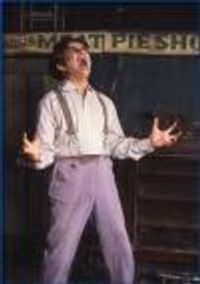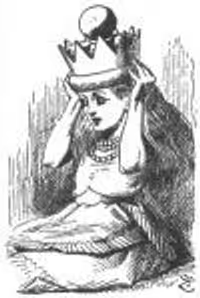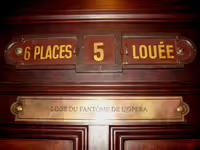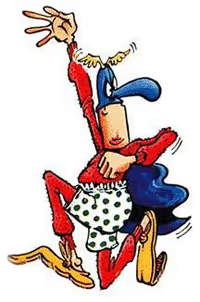Musicals that should no longer be performed (or at least updated)
#25Musicals that should no longer be performed (or at least updated)
Posted: 11/5/18 at 10:34pmMemphis? You mean, “White Savior Love Story: The Musical”?
#26Musicals that should no longer be performed (or at least updated)
Posted: 11/5/18 at 10:37pm
bwayobsessed said: "To answer the question, I’d say Camelot. I think there’s something there but it needs major rewrites."
Agreed, but not because it has become dated. The basic theme of human ideals of perfection v. the reality of human imperfections has been "contemporary" since OEDIPUS c. 500 BCE.
CAMELOT needs to be reworked because the book wasn't very good to begin with.
ETA I'd love to see the David Lee/"intimate" version mentioned above. Such a gorgeous score!
#27Musicals that should no longer be performed (or at least updated)
Posted: 11/5/18 at 10:43pm
Mister Matt said: "
I'll admit, I'd love to see some of those with their original books and scores intact. Especially Of Thee I Sing, Girl Crazy, Good News and Anything Goes."
I think I mentioned that UCLA did a very good production of the original book and score of BABES IN ARMS. If one had a reasonable knowledge of the 1930s, the many topical references were comprehensible, but the entire exercise had a sort of "coolness" about it, akin to visiting a museum.
Of the shows you mention, OF THEE I SING remains charming, but it would have to seem quaint to anyone coming of age in the post-Reagan era. This is by no means to say it can't be done or should be rewritten; nobody need fool him/herself, however, that its sarcasm still has much bite. IMHO, obviously.
#28Musicals that should no longer be performed (or at least updated)
Posted: 11/5/18 at 10:46pm
Mister Matt said: "Well, it is a shame that Shakespeare plays just couldn't hold up for more than 400 years."
Yeah, but if we are honest, a lot of the comedies are hammed up by the director and cast to compensate for the fact contemporary audiences don't get the jokes in the script.
#29Musicals that should no longer be performed (or at least updated)
Posted: 11/5/18 at 10:52pm
The Distinctive Baritone said: "Yup. Merchant is totally anti-Semitic, and Shrew is totally sexist. Having done both shows, I can say there’s really not much you can cut from the text to solve the respective problems in these two particular shows - you kinda just have to make certain acting and directing choices to tone down the offensiveness and hope for the best."
The Meryl Streep/Raul Julia SHREW in the Park in the early 1980s, was already drawing boos from the feminists in the crowd. But those two great actors somehow, with few text changes it seemed to me, made it feel like a journey to equality, not male superiority. There was no booing by the end of the evening, not on the nights I went.
wonkit
Broadway Legend Joined: 9/30/08
#30Musicals that should no longer be performed (or at least updated)
Posted: 11/5/18 at 11:06pm
I love discussing Shakespeare but the original question was musicals. Do musicals become outdated faster for some reason? Shakespeare was writing for an audience he knew well 400 years ago and we may not like the attitudes of the time but it is not because they are badly written. Will there come a time when no one tolerates the suspension of disbelief required when apparently real people burst into song and dance?
#31Musicals that should no longer be performed (or at least updated)
Posted: 11/5/18 at 11:19pm
^^^ Wonkit, musicals before Oklahoma! in 1943 tended to feature vaudeville comics doing topical routines borrowed from their vaudeville acts. These routines were simply written into the book of each show, and additional topical jokes were added on top. For every classic like "Who's on First?", there were 15 shows with jokes that make little sense now except to scholars of the period.
As a rule, these comic turns had little to nothing to do with the plot. (Jerome Kern and P.G. Wodehouse wrote slightly more integrated musical comedies, but the humor was still pretty conventional per its time.)
Some of this tradition survives in shows like Pajama Game, where Eddie Foy, Jr. brought his vaudeville skills to "Hinesy", and I Had a Ball, where Buddy Hackett, um..., was Buddy Hackett.
The original production of Babes in Arms, the revival of which I mentioned above had references to people like Lindbergh that today's audiences (at least those of a certain age) still get. But there were even more attempts to wring humor out of references to socialites or starlets or gossip columnists of the 1930s. (Think Kardashian and Sarah Huckabee Sanders jokes and how they will play 80 years from now.)
One might say comedy itself tends to date more quickly than tragedy, unless the comedy is very universal.
#32Musicals that should no longer be performed (or at least updated)
Posted: 11/6/18 at 8:00am
If I recall, those revivals used the 1990s "Light on Our Feet" dance sequence, instead of the original song "All Dark Peoples Is Light on Their Feet," for obvious reasons.
#33Musicals that should no longer be performed (or at least updated)
Posted: 11/6/18 at 10:35am
The easiest form of comedy is cheap cultural catharsis, which is something that shows like South Park and Family Guy, not to mention Saturday Night Live, have leaned heavily on for a long time. You bring a lot of people together, point at something bothersome and say, "look, don't we all recognize this as being worthy of dismissal?", and everyone laughs to signal their approval. I don't think any comedy ages quicker than that - it's like junk food relevance, easier than pointing up something more substantially universal.
To be fair, writing a comedy that's funny forever is nearly impossible, because comedy itself changes so drastically, which is why, as someone else noted, actors essentially become translators. "Taming of the Shrew", on the page, is crushingly unfunny, but in the hands of acting alchemists like Raul Julia and Meryl Streep, it was solid gold.
Woman of the Year's showstopper, "The Grass Is Always Greener", now makes no sense to anyone but people who were alive then and people whose parents kept Erma Bombeck books in the bathroom. Was "That Was A Real Nice Clambake" ever a funny number?
ScottyDoesn'tKnow2
Broadway Legend Joined: 1/22/14
#34Musicals that should no longer be performed (or at least updated)
Posted: 11/6/18 at 10:43am
I admit that I'm more familiar with the How to Succeed in Business Without Really Trying film than I am with the stage version. When I recently saw it, I actually thought it was a very relevant piece that still applies today. I think a great director would take the gender dynamics and make it a commentary about the glass ceiling and how even now those in management and prone to get promotions in corporations are still most likely to be men. Statistically, (white) women have made strides since the 1960s but it's still not all the way there. I also loved the satire into work life at a cog in the corporate machine. One outdated thing, out of a few that had be discussed earlier, is the idea of being a "company man". That doesn't seem to exist as much anymore as people are more mobile in changing from one position at one company to another because of lack of mobility or the speed of getting a better paying job is faster if you keep sending one's resume out.
#35Musicals that should no longer be performed (or at least updated)
Posted: 11/6/18 at 10:48am
I've always wondered about how H2$ would play with a black Finch, using the Book to get ahead in a mostly-white company. The trouble is "Brotherhood of Man." With its lampooning of Dixieland and Gospel, and pro-mediocrity and shiftlessness message- not to mention the double entrendre of "you are a brother" and "you need a brother's leadership" etc.- with a black Finch it would either play as devastatingly dark comedy (Finch literally shucking and jiving his way out of a problem as the oblivious whites smile and nod) or as minstrel show (Finch Uncle Tomming for his life).
#36Musicals that should no longer be performed (or at least updated)
Posted: 11/6/18 at 11:01am
I'm sure many people here will disagree, but Carousel fits this category for me. Not just because of the abuse storyline or the sexism... the language as a whole is incredibly dated and had me cringing the entire time during this most recent production. I'm guessing that if I had known the show well and it had a nostalgic place in my heart I might feel differently, but I went in not knowing much about the plot and had my mouth open in shock for most of the show at how bad it was.
Though the score is of course stunning. I'm completely on board with it being performed as a concert version.
VintageSnarker
Broadway Legend Joined: 1/30/15
#37Musicals that should no longer be performed (or at least updated)
Posted: 11/6/18 at 11:29am
ScottyDoesn'tKnow2 said: "One outdated thing, out of a few that had be discussed earlier, is the idea of being a "company man". That doesn't seem to exist as much anymore as people are more mobile in changing from one position at one company to another because of lack of mobility or the speed of getting a better paying job is faster if you keep sending one's resume out."
I think it still works. Sure there's a gig economy and a lot of freelancers and even CEOs jumping from company to company. But there's still corporate culture and sycophants and people who don't want to innovate or make waves for fear of losing their jobs. On a darker note, that's why sexual harassment training tells you there won't be repercussions for coming forward and that it's important to not be a bystander.
#38Musicals that should no longer be performed (or at least updated)
Posted: 11/6/18 at 11:58am
The issue I take with the original post is the implication that EVERYONE should feel and behave in the same way and that to disagree or deviate is "wrong" and should create shame.
I think back to the Gloria Steinem era when women were shamed if they were content with the choice to be a housewife, not take a job outside the home, or found self-worth and satisfaction in providing meals for their families, taking care of their homes, and were content not to compete with traditionally male-centric roles.
Additionally, a certain amount of male-bashing was considered acceptable - as is true now, in the wake of the #metoo allegations.
Steinam's views were FANTASTIC for women in general, and specifically for women who wanted to rise above what had been traditional expectations for women. BUT - for those women who found satisfaction and contentment living what were considered traditional roles and lifestyles, it took FOR-E-VER before they were respected again for making that choice, and the general public began to acknowledge that being a housewife, mother, etc. IS a job that some women find fulfilling.
If the OP wants to be specific about what elements of H2$ are so cringe-worthy, perhaps there could be a conversation, but I'm definitely not a fan of the blanket approach that anything that even *hints* at offending #metoo proponents should be eliminated. That's just history repeating itself - and not in a forward-thinking way.
barcelona20
Broadway Legend Joined: 1/19/08
#39Musicals that should no longer be performed (or at least updated)
Posted: 11/6/18 at 12:30pm
Examples in the latest version I saw...
1. Rosemary is desperate for a man, no matter how poorly he treats her. "happy to keep his dinner warm"
2. All the women were secretaries or viewed as sex objects.
3. There were several jokes which I can't remember the exact wording unfortunately.
In doing some more online research just now, I came across this, Charles McNulty of the Los Angeles Times opined that the musical "is hampered by a dated book" and that its "episodic structure now seems as belabored as a sitcom plucked from a rusty time capsule", while "all the romantic brouhaha with moony secretaries is beyond retro."
#40Musicals that should no longer be performed (or at least updated)
Posted: 11/6/18 at 12:34pmHOW TO SUCCEED IN BUSINESS....is a satire. Do some of you not understand what that means? Even in 1962, it was commenting on the way women were treated in society and in the workplace.
#41Musicals that should no longer be performed (or at least updated)
Posted: 11/6/18 at 1:10pm
barcelona20 said: "Examples in the latest version I saw...
1. Rosemary is desperate for a man, no matter how poorly he treats her. "happy to keep his dinner warm"
"Desperate for a man" or desirous of being married? Why is that a bad thing? "...no matter how poorly he treats her?" huh... like he beats her? abuses her? Why do you feel she should be shamed for wanting to be a care giver to her spouse?
2. All the women were secretaries or viewed as sex objects.
'Personal assistants' or 'office managers' require employees to have fantastic organizational skills and high-level manual skills. Do you feel it's accidental, or just coincidence that women were often selected for roles that require that level of responsibility?
As for "sex objects", how do you feel about the number, "A Secretary Is Not a Toy", sung predominantly by the men? Just a reminder that in today's world, the term "work spouse" (husband or wife) is acceptable as a term of endearment for a non-sexual relationship with a co-worker.
3. There were several jokes which I can't remember the exact wording unfortunately.
In doing some more online research just now, I came across this,Charles McNulty of theLos Angeles Timesopined that the musical "is hampered by a dated book" and that its "episodic structure now seems as belabored as a sitcom plucked from a rusty time capsule", while "all the romantic brouhaha with moony secretaries is beyond retro.""
One man's opinion, that I happen to disagree with, but each to his own.
barcelona20
Broadway Legend Joined: 1/19/08
#42Musicals that should no longer be performed (or at least updated)
Posted: 11/6/18 at 1:22pm
I may not be the best at expressing my thoughts, so I'll let Peter Marks do it for me instead from the recent Kennedy Center production.
https://www.washingtonpost.com/entertainment/theater_dance/how-to-succeed-is-a-tired-musical-whose-sexist-humor-is-a-little-tired-too/2018/06/08/068c364a-6acf-11e8-bbc5-dc9f3634fa0a_story.html?utm_term=.8423cedeef07
Well, it’s really trying at times, that’s for sure. Salvaged by a rousing finale and a few other buoyant numbers, the Kennedy Center’s expertly executed “concert” revival of “How to Succeed in Business Without Really Trying” is a lively enough affair. But those hackneyed jokes — and that grating subplot about trapping a man! If director Marc Bruni reveals anything in a talent-packed production that runs through Sunday, it’s the 1961 Pulitzer Prize-winning musical’s age.
#43Musicals that should no longer be performed (or at least updated)
Posted: 11/6/18 at 1:28pm
H2$ is a good example of a musical that needs a firm hand to guide it, lest people mistake its subversive satire about how people change themselves to fit a perceived ideal for dull misogyny. Robert Morse was great casting, because he's so shifty and conniving that he fits the biting, cynical atmosphere, which is where the Radcliffe casting failed. One of the reviews of the revival suggested that you don't particularly want Frump to succeed, which is kind of the point of the show, but a point that production failed to communicate.
#44Musicals that should no longer be performed (or at least updated)
Posted: 11/6/18 at 1:33pm
Charley Kringas, your note on Robert Morse versus Daniel Radcliffe was interesting. Morse in the original was viewed as a weasel, a manipulative conniver who plays the system to get ahead. A true antihero.
The trouble today is, THAT element of satire is more or less obsolete, since everyone knows big business (and business in general) relies on name-dropping, politicking and passing the buck. It's no longer subversive to suggest that people get ahead by "playing the game" as much as they do by merit, so Finch seems much less amoral than he used to. Radcliffe seemed like something of a go-getter, not a manipulator; in an interesting twist, the laid-back "chill" vibe Darren Criss projected into the role made him seem like an affable idiot bluffing his way to the top, which gave the role a little bit more of a satiric bent.
#45Musicals that should no longer be performed (or at least updated)
Posted: 11/6/18 at 2:48pm
HumanHeart said: "The Phantom of the Opera. Yes, it's a classic, but it suffers from several flaws. The Broadway version feels dated and has basically been the same since it opened."
I couldn't disagree more; I think it's timeless. The fact that a show "has basically been the same since it opened" is not a valid reason for making changes to it. It's not like repainting your bedroom.
"Michael Riedel...The Perez Hilton of the New York Theatre scene"
- Craig Hepworth, What's On Stage
#46Musicals that should no longer be performed (or at least updated)
Posted: 11/6/18 at 3:48pm
Lot666 said: "HumanHeart said: "The Phantom of the Opera. Yes, it's a classic, but it suffers from several flaws. The Broadway version feels dated and has basically been the same since it opened."
I couldn't disagree more; I think it's timeless. The fact that a show "has basically been the same since it opened" is not a valid reason for making changes to it. It's not like repainting your bedroom."
It's hard to know what is meant by "dated" and what the "several flaws" might be without examples. Still, although my bedroom is exactly the same, with the same furniture, windows, door, etc..., a fresh coat of paint does make me look forward to entering the room again, ![]()
#47Musicals that should no longer be performed (or at least updated)
Posted: 11/6/18 at 5:00pm
and I Had a Ball, where Buddy Hackett, um..., was Buddy Hackett.
Oh, but that title song as sung by Dolores Gray is DIVINE.
and people whose parents kept Erma Bombeck books in the bathroom.
If Life's a Bowl of Cherries, What am I Doing in the Pits?!?! HAHAHAHAHAHA!! Oh, that Bombeck.
Was "That Was A Real Nice Clambake" ever a funny number?
Was it supposed to be FUNNY? Maybe that's why I always hated it.
I think it still works. Sure there's a gig economy and a lot of freelancers and even CEOs jumping from company to company. But there's still corporate culture and sycophants and people who don't want to innovate or make waves for fear of losing their jobs.
Oh, absolutely. Most major companies still pretend to reward longevity and promote internal advancement in order to manufacture loyalty, especially from lower management and grunts. I've seen lifers who may get tossed a couple of bones in the way of meaningless promotions (with minimal-to-no-salary increase and zero authority) who never stop cheer leading for the company because the Kool-Aid permanently addled their brains into thinking it's DELICIOUS. They truly believe they owe their LIVES to the company and view any investigation of comparable positions/compensation with outside companies to be traitorous. If you've ever had to sit in on a large corporate motivational/management meeting or town hall, it might seem unbelievable to you, but it is very much alive and well in today's America.
#48Musicals that should no longer be performed (or at least updated)
Posted: 11/6/18 at 8:02pm
HumanHeart said: "1) Chicago. It could be incredible if it was redone. They should take away that giant on-stage orchestra band that takes up 70% of stage space and have real scene changes, costume changes, and elaborate sets and props. It's very monochromatic and dated as it is now.
2) The Phantom of the Opera. Yes, it's a classic, but it suffers from several flaws. The Broadway version feels dated and has basically been the same since it opened. I've seen the production over ten times, and each time, I notice how overdue it is for a fresher look. The US tour sort of tries to steer it into this direction, but, the tour is plagued with cheap looking sets, costumes, and questionable blocking / acting choices. The photos of the newly re-imagined version in Norway look incredible and it would be nice to have something like that here."
Err, I don't think they meant how to update still-running shows that are still making money. Those are the current productions of those shows, the thread is about future productions...
#49Musicals that should no longer be performed (or at least updated)
Posted: 11/7/18 at 3:28am
HumanHeart said: "To answer your question:
1) Chicago. It could be incredible if it was redone. They should take away that giant on-stage orchestra band that takes up 70% of stage space and have real scene changes, costume changes, and elaborate sets and props. It's very monochromatic and dated as it is now."
you know it used to include those things but it was changed in the 90s?
Videos











